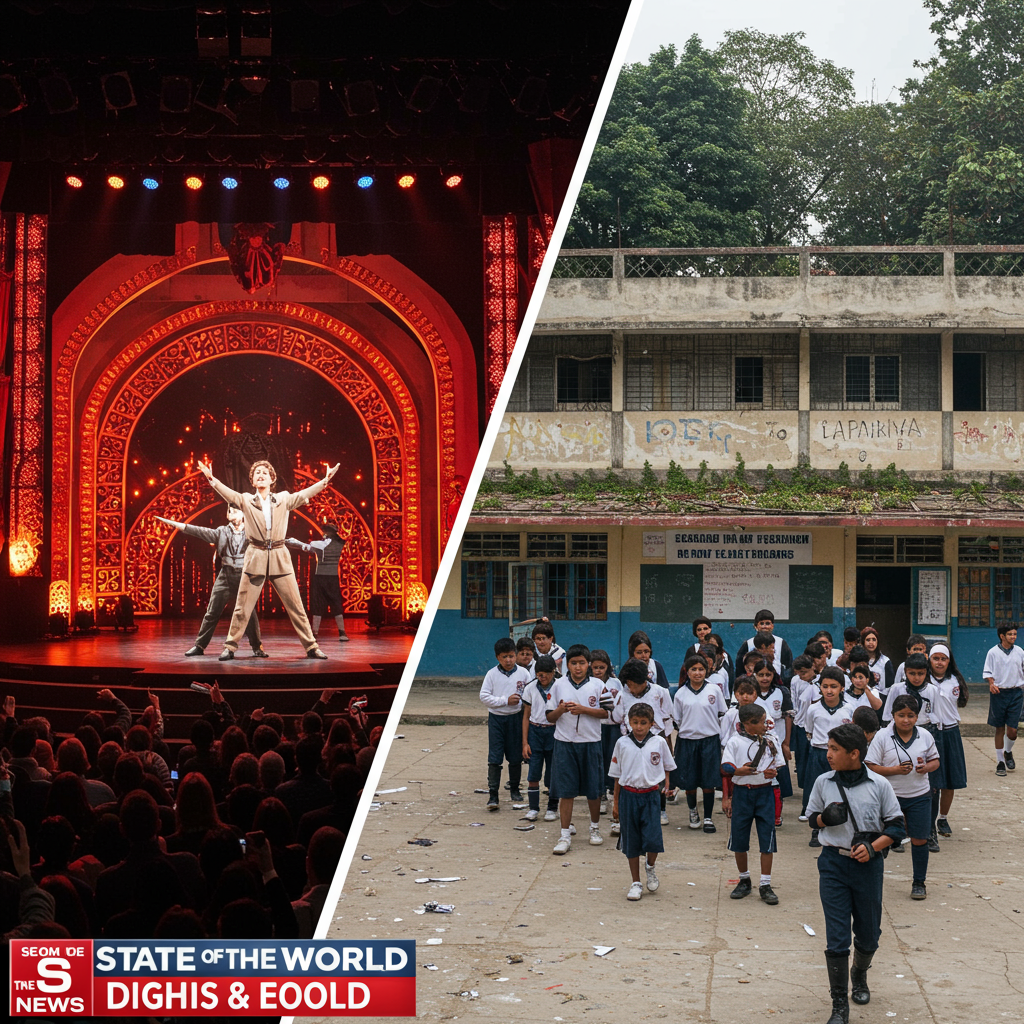Global events often present a stark contrast, highlighting moments of artistic beauty alongside pressing human challenges. From a beloved musical number echoing through London’s historic theater district to disturbing reports of criminal activity threatening education in Peru, the world stage remains dynamic. NPR’s “State of the World” program frequently captures these diverse snapshots, offering listeners a concise look at significant international developments and why they matter. Drawing on NPR’s global network, the program aims to provide factual reporting directly from the ground, helping audiences understand complex issues.
This particular report delves into two distinct stories: a unique public performance tied to the musical “Evita” in London and a troubling trend of gang-related extortion targeting schools in Peru. While seemingly disparate, both reflect facets of life in different parts of the globe in mid-2025 – one showcasing cultural resilience and accessible art, the other exposing vulnerability to organized crime amidst ongoing societal challenges. Understanding these stories requires looking closer at the specific details from each location.
Evita’s Signature Song Rings Out in London’s West End
In London’s vibrant West End, home to world-renowned theaters, a special event offers the public a taste of musical theater magic without needing a ticket. The iconic signature song from the musical “Evita,” “Don’t Cry For Me Argentina,” is being performed nightly in the street. This unique public spectacle allows passersby and fans alike to experience a powerful moment from the show for free. It’s a notable departure from the typical ticketed experience inside a theater.
A Balcony Performance Captivates Crowds
This particular open-air performance takes place outside the London Palladium. On June 18, 2025, for instance, actress Rachel Zegler, portraying the role of Eva Perón in “Evita,” delivered the famous ballad live from a balcony at the venue. This creates a dramatic and engaging scene, drawing the public’s attention right in the heart of the theater district. The opportunity to witness such a performance up close, outside the formal setting of the stage, provides a fresh and accessible way to connect with the musical. Attending a recent performance offers a firsthand account of the atmosphere and the public’s reaction to this unexpected treat. It highlights how theater can extend beyond its traditional walls to engage with the community.
Gangs Target Schools in Peru’s Crime Wave
Across the globe, Peru faces a different kind of daily reality. The country has been grappling with a broader crime wave that intensified during the COVID-19 pandemic. This surge in criminal activity has taken a particularly disturbing turn, with gangs now specifically targeting private schools. These schools are often located in poorer neighborhoods, making them and their communities particularly vulnerable to exploitation.
Extortion Threats Plague Administrators and Parents
The core issue is extortion. Gangs are leveraging threats to demand money from these educational institutions. This places immense pressure on school administrators tasked with keeping their students and staff safe. It also creates significant stress and fear among parents who are concerned for their children’s well-being. The threats introduce a dangerous element into daily life, disrupting the fundamental purpose of schools as safe spaces for learning. Dealing with these threats involves navigating complex and often terrifying situations, with administrators and parents forced to make difficult decisions under duress. The report highlights the human element of this crisis, focusing on the difficult realities faced by those directly impacted in these vulnerable communities.
Understanding Peru’s Post-Pandemic Crime Landscape
Peru’s struggle with this crime wave provides a window into the societal impacts of the pandemic beyond health crises. Economic instability and social disruption can exacerbate existing criminal networks or give rise to new ones. The targeting of schools, particularly in less affluent areas, suggests a calculated move by gangs to exploit vulnerable institutions and populations for financial gain. This trend underscores the challenges faced by nations in restoring security and stability in the aftermath of global events. The NPR segment explores how individuals on the ground are coping with this alarming development.
The juxtaposition of these two stories – the vibrant, accessible cultural event in London and the grim security challenges faced by schools in Peru – reflects the complex and varied state of the world. News programs like “State of the World” aim to capture these diverse realities, reminding us of both the resilience of the human spirit in creating moments of joy and the persistent struggles against crime and insecurity that affect communities globally.
Frequently Asked Questions
What is the specific public “Evita” musical performance happening in London’s West End?
A unique public performance related to the musical “Evita” is taking place nightly outside the London Palladium in the West End. Actress Rachel Zegler, playing Eva Perón, performs the show’s signature song, “Don’t Cry For Me Argentina,” live from a balcony. This allows people to experience a piece of the musical without needing a ticket, offering a free and accessible cultural moment in the heart of London’s theater district.
Why are gangs in Peru targeting schools, and what areas are affected?
Gangs in Peru have begun targeting private schools for extortion as part of a larger crime wave that intensified during the COVID-19 pandemic. These criminal groups are demanding money through threats, focusing particularly on schools located in poorer neighborhoods. This strategy exploits vulnerable institutions and communities, adding significant security challenges for administrators and parents in affected areas.
How are school administrators and parents in Peru dealing with gang extortion threats?
The report indicates that school administrators and parents in Peru’s poorer neighborhoods are actively grappling with the threats of gang extortion. They are described as having to “deal with the threats,” implying they are navigating challenging circumstances to protect their schools and children while facing demands for money under duress. The specific methods of coping or resistance are a key part of the NPR segment.



